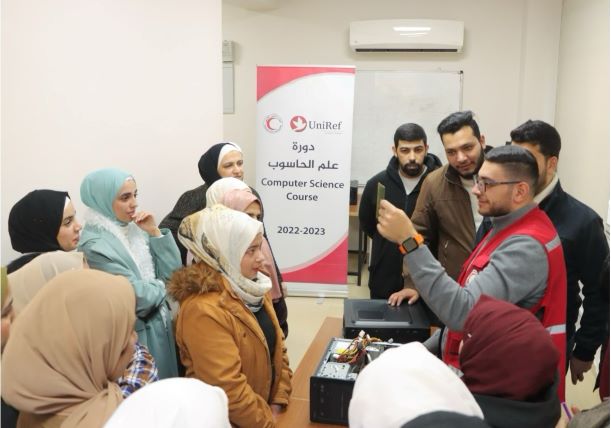WFP Food Reaches Families in Northwest and Other Parts of Syria Affected By Devastating Earthquakes

Areas of Syria closest to the epicentre of the earthquakes have been strained by 12 years of conflict and people there were already living in extremely difficult conditions. Freezing temperatures add to their plight and make rapid humanitarian action essential.
· The quake-affected cities of Latakia, Tartous, Hama, Aleppo, and Idlib in Syria had already been severely impacted by the conflict. Ninety percent of Idlib’s 4.4 million population depends on humanitarian assistance.
· Nearly half of the displaced population in Syria live in the northwest region in tents, makeshift shelters, or destroyed and abandoned buildings, with most services not functioning including hospitals.
· Syrians are already grappling with an economy that is too fragile to withstand external shocks. A currency which has fallen to a new record low and the soaring prices of food and other essentials are the biggest factors behind the growing needs in Syria.
WFP is committed to working with its humanitarian partners and local authorities to bring life-saving assistance to those affected by the earthquakes in Türkiye and Syria. WFP has been working in both countries for many years and is well-equipped to respond.
· WFP is appealing for US$46 million to provide assistance through food rations and hot meals for a total of 500,000 quake-affected people in Türkiye and Syria. This includes 200,000 newly displaced people in Syria and 300,000 people in Türkiye, including 70,000 refugees.
· WFP has launched a fundraising campaign to support its response efforts in Türkiye and Syria.
WFP RESPONSE
Türkiye
· In Türkiye, WFP teams are delivering food to support municipalities in southeast Türkiye in expanding soup kitchens that are providing daily hot meals for quake-affected people. WFP will increase its assistance to Syrian refugees as well as provide food rations for Turkish citizens displaced by the quakes and sheltering in refugee camps.
· WFP will initially provide 6.4 million meals for 230,000 affected people through community and partners’ soup kitchens and assist 70,000 refugees and internally displaced Turkish nationals with family food packages.
· Refugees are normally assisted through electronic vouchers, but the assistance will be switched to food packages as supermarkets are now unable to accept vouchers. WFP will continue to review its response plan, as needs arise.
· At the request of the Presidency of Migration Management (PMM), WFP is starting to distribute food packages (that last for one week) to 17,000 Syrian refugees and internally displaced Turkish nationals temporarily housed in camps. New camps are also being opened to accommodate additional Turkish nationals in the coming days.
· WFP is also activating agreements with disaster-affected municipalities in Adana, Adiyaman, Battalgazi, Gaziantep, Hatay, Kahramanmaras, Kilis, and Sanliurfa in response to their official requests for in-kind food assistance.
· Building on WFP’s successful soup kitchens initiative during the COVID-19 pandemic, WFP will procure food for the municipalities to enable them to provide hot meals, twice a day, to earthquake-affected people for at least 14 days initially. This will be scaled up as needs evolve.
· Infrastructure in some of the affected areas is vulnerable because of recent conflict in bordering Syria. Gaziantep hosts the second-highest number of Syrian refugees (nearly half a million) in the country, after Istanbul. A total of 3.5 million Syrian refugees live in Türkiye as of January 2023.
· On top of acute inflation over the last 12 months, prices are expected to rise further as supply chains struggle to respond to needs after the earthquake.
· Coal demand for heating s will be extremely high, adding extra costs for all struggling to keep warm.
Syria
· Syria has already suffered severe damage to infrastructure over 12 years of conflict, especially in areas closest to the quake epicentre in Türkiye.
· Syrians are now also being hit by an ongoing cholera outbreak and harsh winter weather, including heavy rain and snow over the weekend.
· WFP is coordinating its food assistance response with the Syrian Arab Red Crescent (SARC), local relief committees and other humanitarian partners in all locations. The International Committee of the Red Cross (ICRC) is also contributing ready-to-eat rations in Aleppo in coordination with WFP.
· In Aleppo, north Syria, WFP rapidly provided hot meals to 4,000 affected people at temporary shelters through its partner kitchens. Assistance will continue until at least 11 February, subject to ongoing needs assessments. WFP is also distributing ready-to-eat meals through partners, sufficient for 5,000 affected people.
· In the coastal governorates of Tartous and Lattakia, WFP is providing hot meals to displaced and affected households, with the goal of reaching 5,000 people by 11 February.
· In Lattakia governorate, WFP is also distributing ready-to-eat meals through partners, sufficient for 6,000 affected families. As WFP scales up its response, ready-to-eat meals sufficient for 30,000 people were dispatched to Lattakia on 7 February, with more to be dispatched on 8 February following discussions with cooperating partners and the food security sector.
· Following the week-long school closure, WFP also plans to distribute school meals to children at temporary shelters in Aleppo governorate.
· WFP is exploring commercial solutions to replenish ready-to-eat rations for 125,000 people for 14 days in northwest Syria.
· WFP already serves 1.4 million people every month in NW Syria alone
· Within 36 hours WFP had provided partners on the ground inside NW Syria with enough ready to eat foods to feed 40,000 people for a week.
· By the weekend WFP will have provided partners with enough food for 125,000 people for a week
· It is urgent that WFP get more of the food we already have on hand into this hard hit area
· Roads between Türkiye and Bab Al-Hawa border crossing point are damaged but still remain accessible. The UN Transhipment Hub is currently accessible and operative, however the Bab Al-Hawa border crossing point is not yet operating at normal capacity.
· On 9 February, six trucks from IOM were able to cross to Northwest Syria through the border. WFP is planning its next transshipment of food commodities on 15 February, as currently there is enough food prepositioned inside to cover immediate needs.
# # #
The United Nations World Food Programme is the world’s largest humanitarian organization, saving lives in emergencies and using food assistance to build a pathway to peace, stability and prosperity for people recovering from conflict, disasters and the impact of climate change.
Follow us on Twitter @wfp_media
Shotlist and Info:
Shot: 7-9 Feb 2023
Locations: Jindires/Aleppo/Damascus, Syria
TRT: 2:30
:00-:31
GVs of destruction in Jindires, Northwest Syria.
Due to the conflict, NW Syria is a complicated area to reach anyway. The earthquakes exasperates the problem by damaging roads and creating more need.
Ambulances, excavators, people digging through the rubble of collapsed buildings.
Shot: 08Feb23
Jindires, Syria
:31-1:00
SOT Kenn Crossley, WFP Syria Country Director (English)
“A few days ago a horrible devastating earthquake here in Syria as well as in Turkey. Hundreds perhaps thousands dead, thousands injured, tens, maybe hundreds of thousands of people displaced, losing their homes, people unable to get back into the places where they sleep, sleeping on the streets huddling in shelters. For the World Food Programme of course, for us it matters, that people have to eat. Within hours of the earthquake we were working with local partners people were eating hot meals in the shelters that they were living in.”
Shot: 09Feb23
Damascus, Syria
1:00-1:27
GVs of WFP food distribution in Jindires.
Due to the conflict, NW Syria is a complicated area to reach anyway. The earthquakes exacerbates the problem by damaging roads and creating more need. Within 36 hours of the earthquake WFP had provided partners on the ground inside Northwest Syria with enough ready to eat meals to feed 40,000 people for a week. By the weekend WFP will have provided partners with enough food for 125,000 people for a week. WFP already serves 1.4 million people every month in Northwest Syria alone.
Shot: 08Feb23
Jindires, Syria
1:27-1:45
SOT Kenn Crossley, WFP Syria Country Director (English)
“One of our biggest challenges right now is not the transport, it’s not the food, it’s access. Some of the people hardest to reach are in places where there is ongoing conflict. We need the people who are in these places – we need to be able to reach the people who are in these places where there is ongoing conflict.”
Shot: 07Feb23
Damascus,Syria
1:45-2:09
Emergency responders search for survivors in Al Mashareqa neighbourhood.
Shot: 09Feb23
Aleppo, Syria
2:09-2:30
Distribution of WFP hot meals to earthquake survivors going on into the night.
In Aleppo, WFP rapidly provided hot meals to 4,000 affected people at temporary shelters through its partner kitchens. Assistance will continue until at least 11 February, subject to ongoing needs assessments. WFP is also distributing ready-to-eat meals through partners, sufficient for 5,000 affected people.
Shot: 08Feb23
Aleppo, Syria
Last Updated on 2 years by News Desk 2













